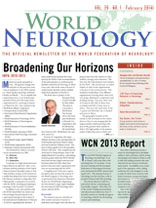By Mohammad Wasay MD, FRCP, FAAN
There are many days related to neurological diseases being celebrated by professional organizations in collaboration with the World Health Organization, national organizations and local health ministries, including World Stroke Day, Epilepsy Day and Rabies Day. These days have proved to be extremely helpful in promoting public awareness and generating advocacy throughout the globe including non-developed Asian and African countries.
For example, the World Stroke Organization announced a global competition for public awareness and advocacy campaign focusing on World Stroke Day. In 2012, Brazil, and in 2013, Sri Lanka won the competition creating a huge impact at the national level as well as the regional level. All of the days related to neurology are linked to neurological diseases.
A few years ago, Vladimir Hachinsky, then-WFN president, asked, “Why don’t we celebrate a day for the healthy brain?” The human brain is so fascinating and is so closely linked to the health of the whole human being that we should promote healthy brains. The future of this universe is linked to our brains so we should start a global campaign with the slogan: “Our brains, our future.” This was suggested by the Public Awareness and Advocacy Committee.
Because the World Federation of Neurology was established on July 21, the Public Awareness and Advocacy Committee suggested that World Brain Day should be celebrated on the same date. This proposal was announced at the WCN Council of Delegates meeting in September, and the proposal was received with a warm welcome by delegates; Hachinsky; Raad Shakir, WFN president-elect; Werner Hacke, WFN vice president; and other officials. Our target audience is young brains throughout the world, and we want to promote healthy brain and brain health. Young students and minds are highly interested in knowing how the brain works and how can we make it work better.
We should target to approach one billion people around globe to educate about the brain in 2014. Most activities will focus near World Brain Day but it is a year-long campaign. National societies should plan activities aimed at young school and college students, and with the help of social and electronic media, the information could go to millions of people. All societies should share their plans and activities, and organizations with the highest impact public awareness activities should be awarded.
We should especially focus efforts on Facebook and Twitter to connect with millions of people. Our Young Neurologists Network on Facebook could be a great resource for this campaign. We should use multiple languages, especially Chinese, Spanish, French, Arabic, Hindi and German. We also could develop a 5-minute promotional video with a brief introduction of WFN in multiple languages. This video could be shared by millions through YouTube and Facebook. We have more than 140 member societies. If we are able to organize a few hundred programs on July 21 in all of those countries, it is bound to create an impact.
Complexity of brain and neurological diseases often becomes a barrier for public awareness. “You should speak plain when you speak brain,” said Keith Newton of WFN. Our message should be simple and easily understandable for lay people. We could design a logo for this purpose which may be a simple global message. WFN and local organizations could start a poster or cartoon design competition to explain brain function and improve public awareness. Best posters, designs or cartoons could be awarded. We expect thousands of entries for this competition and some of these entries could become logos for our future campaigns.
There are many organizations working in this area, including the International Brain Council, the International Brain Research Organization, the AmericanAcademy of Neurology, the International League Against Epilepsy and the World Stroke Organization. We should work with them for this common agenda. Strong liaison and lobbying with WHO is important. If WHO adopts this day in the future, this could be a great success for WFN.
Wasay is the chair of the Public Awareness and Advocacy Committee for the World Federation of Neurology.
